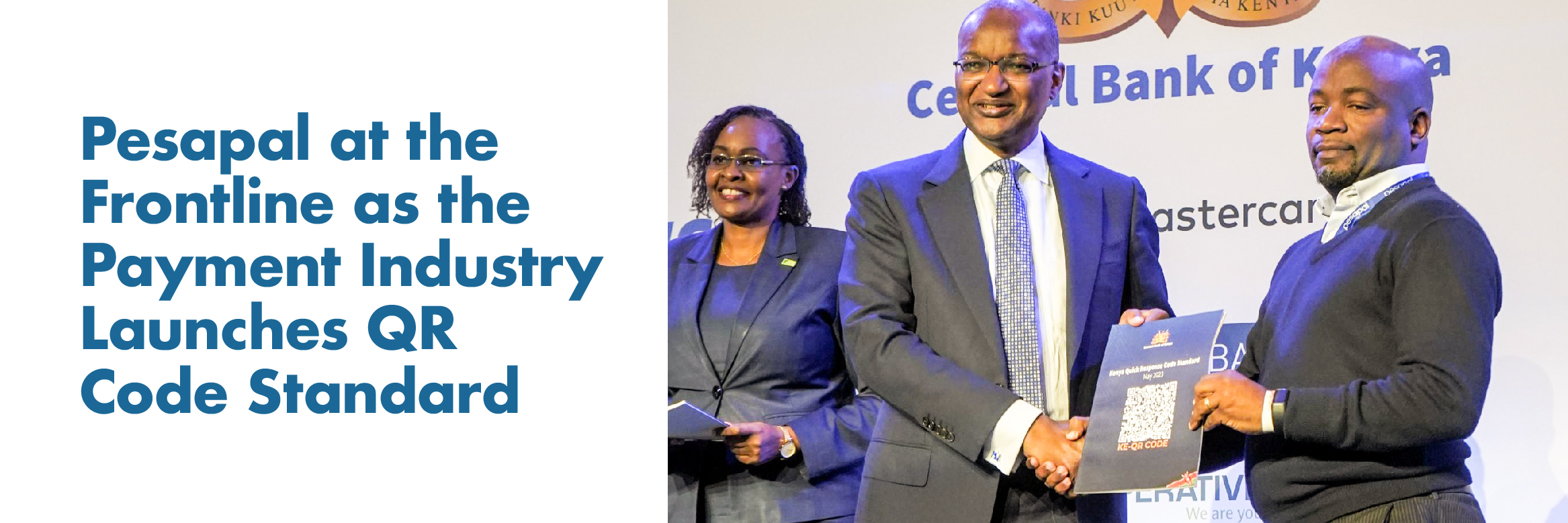
Payments are top of mind as they become critical levers to deliver a smooth user experience and actionable insights and enable new business models. The evolution of payment methods has been a long and complex process, shaped by various technological, social, and economic factors.
In Kenya, as part of this evolution of payments and in line with the National Payment Strategy (NPS) 2022-2025, the Central Bank of Kenya (CBK) has announced the issuance and implementation of the Kenya Quick Response Code Standard 2023 (KE-QR Code Standard 2023; or the Standard). The Standard will guide how Payment Service Providers like Pesapal and banks (institutions) that are regulated by the CBK will issue Quick Response (QR) Codes to consumers and businesses that accept digital payments.
QR Codes are machine-readable codes consisting of an array of black and white squares containing information that provide an alternative option for initiating and accepting digital payments made by customers at various points of sale, such as supermarkets, general stores, and shops, among other outlets.
“The implementation of the Standard, and use of standardised QR Code-enabled payments, will bring practical benefits to businesses and customers. Customers will now be able to make digital payments in an easy, fast, convenient, and secure manner using QR. Previously, customers had to manually input different payment codes and numbers, hence creating friction and cumbersome payment processes that are prone to errors,” CBK said in a statement.
The Standard will also promote inclusion by enabling institutions of various sizes and customer focus to increase adoption digital payments. In the long term, use of standardised QR Codes will facilitate launch of innovative products and deepen the benefits already enjoyed by customers making payments across various institutions and mobile money networks (interoperability).
The Standard, which is based on the EMVCo QR Code Specification, has been developed through collaboration between CBK, Payment Service Providers, banks, and card schemes, among others.
How are QR code payments beneficial to customers and merchants?
The adoption of QR code payments comes with myriad benefits that help customers and merchants.
For customers, the primary benefits of the QR code payments include a simple non-cash alternative, greater protection and safety, and an easy-to-use payment solution.
On the other hand, Merchants will experience an easy onboarding process with low infrastructure costs, guaranteed funds, and lower risk exposure, plus the potential for new sales and the ability to offer new services, e.g. loyalty and rewards.
How can retailers sign up to accept payments via KE QR?
Retailers can start accepting payments via the KE QR Code by following the process provided by their payment service provider.
How can customers sign up to pay via KE QR
Customers can use their mobile banking or mobile money app to pay using the KE QR Code.
Over the centuries, payment methods have evolved to give us the many options we have in the present day. The rollout of the KE QR Code standard is that one small step for the industry, but a giant leap in the payment evolution journey.
About Pesapal Ltd
Thousands of businesses and customers trust us to simplify and secure their payments. Founded in 2009, we're the leading payment services company with local know-how in building payment and business tools for Africa. Pesapal has 300+ people in 5 African countries – and we're adding more. We're on track to connect a million African entrepreneurs and customers to e-commerce, digital payments and the global financial system by 2030.
Pesapal is regulated by The Central Bank of Kenya, Bank of Uganda and Bank of Tanzania.